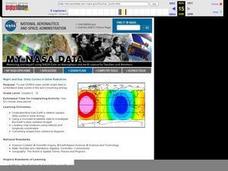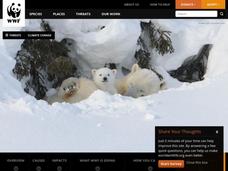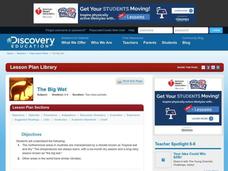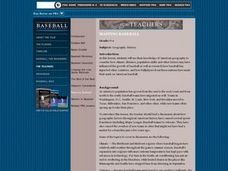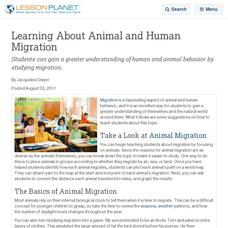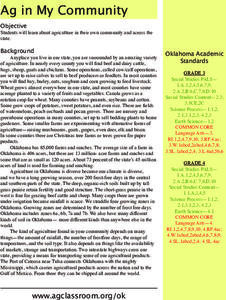Curated OER
Storm Protection
In this weather learning exercise, students read an excerpt about how to protect yourself, others, and property from various types of storms. There are five short answer questions related to the excerpt that students respond to.
Curated OER
A Priceless Collection
Learners read about and discuss life of Russian geneticist Nikolai Vavilov, define terms related to field of genetics, complete worksheets, conduct seed experiments, observe and record results, and locate seed banks on world map or globe.
Curated OER
Japan and Art
Students discuss the art of Japan as it relates to Japanese culture and geography and then create individual postcards reflecting the information learned from the instructional activity. This instructional activity includes possible...
Curated OER
AT YOUR FINGERTIPS
The student will locate countries on a world map from which we import foods that our climate prevents us from growing locally.1. Discuss the term "export." Divide students into groups of four. Give the groups
five minutes to brainstorm...
Curated OER
Korea Cultural Lesson Plan
Students engage in a study of geography and maps of Korea. They examine charts and graphs. Students are expected to interpret the information accurately and completely. The geography skills can be used on other countries as well.
Curated OER
A Thoreau Look at Our Environment
Sixth graders write journal entries o school site at least once during each season, including sketched and written observations of present environment. They can use sample topographical maps and student's own maps. Students can use...
Curated OER
Climate Survival
Students use information about different world climate regions to plan how to survive in a particular climate zone for one year. They present their survival plans.
Curated OER
NIGHT AND DAY: DAILY CYCLES IN SOLAR RADIATION
Students examine how Earth's rotation causes daily cycles in solar energy using a microset of satellite data to investigate the Earth's daily radiation budget and locating map locations using latitude and longitude coordinates.
Curated OER
Climate Change And Disease
Students consider the role of climate change in the occurrence of vector born diseases such as malaria. In small groups, they research a specific vector to complete an information chart on climate changes in the region where the vector...
National Park Service
Living & Non-Living Interactions
What better way to learn about ecosystems than by getting outside and observing them first hand? Accompanying a field trip to a local park or outdoor space, this series of collaborative activities engages children in learning about the...
Curated OER
Telecommunications and the Whole Language Program
Young writers use technology and other media to research information on a chosen topic. They explore countries where keypals and e-mail friends are located. Using their writing skills, they correspond with their e-mail friend and...
Curated OER
How Does the Earth's Energy Budget Relate to Polar Ice?
Learners use satellite data to see how radiation budget relates to the ice that is present in the North. In this energy lesson students correlate data to see a relationship.
Curated OER
The Big Wet
Students complete a research project. In this climate lesson, students learn about the climate "tropical wet and dry" found in Australia. Students work in groups to research aspects of this climate and then create a class presentation.
Curated OER
To Drink or Not to Drink?
Second graders compare water conservation issues as they impact the past, present, and future in Nevada. In this water conservation lesson, 2nd graders perform and ice experiment to comprehend water collection differences. Students...
Curated OER
Mapping Baseball
Students research how climate, distance, population shifts and immigration have influenced American baseball. They also consider how players from other countries have made their mark on American baseball.
Curated OER
Microclimates of Our School
Learners read the story "Weslandia" by Paul Fleischman, define the term microclimate, gather and record data in various places on school grounds to establish the presence of difference microclimates, analyze and compare microclimates,...
Curated OER
Learning About Animal and Human Migration
Students can gain a greater understanding of human and animal behavior by studying migration.
Curated OER
Blooming Thermometers
Students study phenology, or the study of climate change. They research the Japanese springtime festival of Hanami and plot and interpret average cherry blossom bloom date data from the past 1100 years.
Curated OER
The Twelve Months: A Slavic Cinderella Variant
Students locate Slavic countries and identify a few characteristics of those countries. They read and/or listen to the Slavic tale, "The Twelve Months," and compare this version with another Cinderella story.
Curated OER
Shadow Trackers
Students use online websites to inquire about the cycle of day and night. In this web based activity, students are able to see the movement of the sun and Earth. Students can look at different parts of the Earth as if they were on the...
Curated OER
Agriculture
Students examine the types of agriculture in their own state and in their local community. They examine how food makes it to their local grocery store. They compare data from different states.









